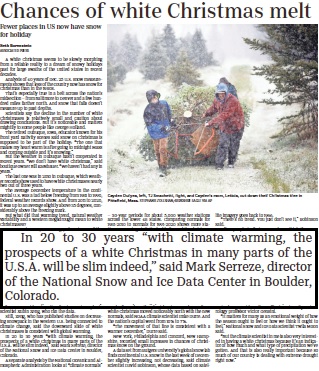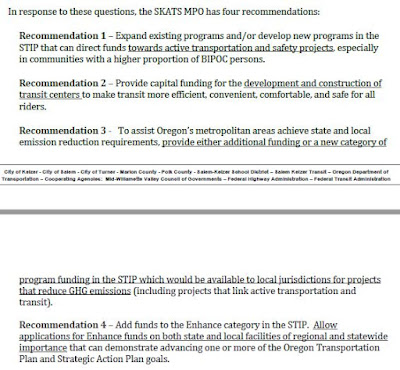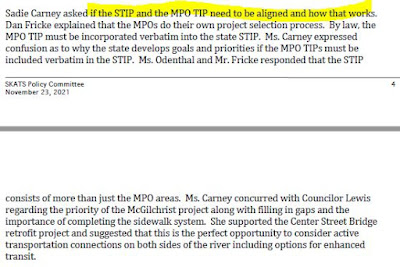The Policy Committee zooms on Tuesday the 21st for the final time in 2021, a week earlier than usual because of the holidays. They also have an abbreviated agenda, and there is not a great deal to note.
The lifting right now is at the level of the technical committee, so the one substantive thing on the agenda is the approval of a letter to ODOT/OTC on recommendations for the extra "flexible" Federal funding coming in the Infrastructure bill.
 |
| In the Sunday paper |
And, it is very pleasant to note, three of the four recommendations directly or indirectly center climate, one on "active transportation and safety," one on "transit centers," and one explicitly for "projects that reduce GHG emissions."
 |
| Three of four recommendations on climate |
The fourth sounds benign, framed as it is with the "enhance" rhetoric, but that's about highway widening essentially, and is not so benign.
 |
| LA Times, Sunday front page |
Still, the overall tone here represents progress, and that is great to see.
In the minutes on the November meeting, there is an interesting exchange, held at the same time they talked about the Public Participation Plan, that tells us something about ways the process is actually structured to be opaque to the public.
 |
| Are the STIP and MPO TIP redundant? |
One of the Committee members asked about the apparent overlap and redundancy between the State's TIP and the MPO's TIP. That's a reasonable question! There's a lot of overlap and it seems like a lot of administrative effort and process goes in to writing two full plans that mostly echo each other. One is a product of State law, the other a product of Federal law. Couldn't we simplify?
It also testifies to the way that even with the oversight provided by Electeds on the MPO Policy Committee, so much power rests with staff and the career bureaucrats at ODOT. They are the ones who understand the process, and with each new crop of Electeds that sit on the committee they get to explain patiently why it's all so complicated or counter-intuitive. "Don't worry, we know what's best."
The Policy Committee zooms at noon on Tuesday the 21st, and the meeting packet and agenda can be downloaded here.
 |
| Meeting info |


4 comments:
I forgot to mention, in an agenda summary blurb at Salem Reporter last week, they noted:
"[Marion County] Commissioners will also consider a $241,000 contract with Salem-based engineering consulting firm DKS Associates, Inc. for a "study and management plan" to evaluate traffic congestion and safety in the Cordon Road, Kuebler Avenue corridor through March 31, 2024."
So that finally is moving forward, and there will be more to say as we follow that study.
To clarify your statement "One is a product of State law, the other a product of Federal law." in the discussion of the STIP/MTIP (Metropolitan TIP).
They are both products/requirements of federal law.
The requirements for the STIP are discussed in 23 CFR 450.218 see
https://www.law.cornell.edu/cfr/text/23/450.218
The requirements for the MTIP are discussed in 23 CFR 450.326 see https://www.law.cornell.edu/cfr/text/23/450.326
For this discussion, section (b) of 450.218 has that the State (i.e., ODOT) shall include the MTIP without change in the STIP.
Regards,
Ray
MWVCOG/SKATS
The process is opaque and inscrutable! (More later)
This wasn't a super high priority, but here's some more.
Here is language from the MWVCOG's own descriptions of the two:
"Salem-Keizer Area Transportation Study (SKATS) is the designated Metropolitan Planning Organization (MPO) for the Salem-Keizer area. A MPO is a federally mandated body for any urban area over 50,000 in population."
That seems pretty clear that the MPO is a Federal product.
"MWACT was the first area commission chartered by the Oregon Transportation Commission (OTC)."
And that seems pretty clear that the ACT is a State product.
For an insider, they might technically both be products of Federal law, but for an ordinary citizen trying to understand the two bodies, there is a clear sense that in broad terms one comes from DC, the other from ODOT.
See
https://www.mwvcog.org/programs/transportation-planning/mwact/
https://www.mwvcog.org/programs/transportation-planning/skats/
Post a Comment